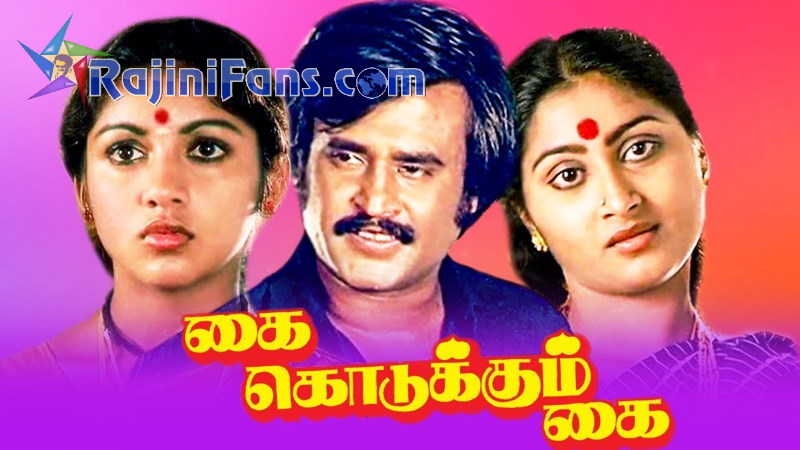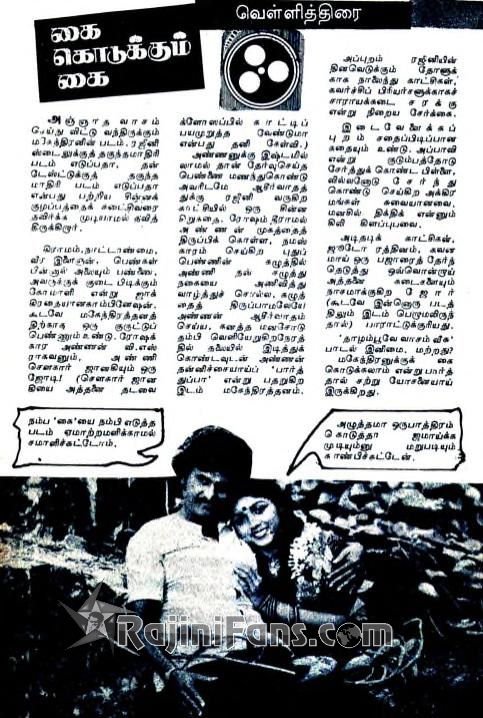|
Kai Kodukkum Kai (1984)

கன்னடத்தில் வெளிவந்த "கதாசங்கமா'' என்ற படம், தமிழில் "கை கொடுக்கும் கை'' என்ற பெயரில் தயாராகியது. கன்னடத்தில் வில்லனாக நடித்த ரஜினிகாந்த், தமிழில் கதாநாயகனாக நடித்தார்.
நடிகர் விஜயகுமார், ரஜினியை வைத்து சொந்தமாகப் படம் தயாரிக்க விரும்பினார். அதை ஏற்றுக்கொண்ட ரஜினி, திரைக்கதை, வசனம், டைரக்ஷன் ஆகிய பொறுப்புகளை மகேந்திரனிடம் ஒப்படைக்குமாறு கூறினார்.
கன்னடத்தில் பிரபல டைரக்டராக விளங்கியவர் புட்டண்ணா. அவர் 1976-ல் "கதா சங்கமா'' என்ற படத்தை எடுத்தார். அந்தப் படத்தில், 3 எழுத்தாளர்களின் மூன்று கதைகள் இடம் பெற்று இருந்தன. மூன்று கதைகளிலும் வெவ்வேறு நடிகர் - நடிகைகள் நடித்திருந்தனர்.
மூன்றாவது கதையின் பெயர் "முனிதாயி.'' அதை விரிவுபடுத்தி, "கை கொடுக்கும் கை'' என்ற பெயரில் படமாக்க மகேந்திரன் முடிவு செய்தார்.
"முனிதாயி'' கதை புரட்சிகரமானது. கதாநாயகியான முனிதாயி, பார்வையற்ற பெண். முற்போக்கான இளைஞன் ஒருவன் அவளைத் திருமணம் செய்து கொள்கிறான்.
அந்த வீட்டில் வேலை செய்யும் சிறுவன் - முனிதாயியை "அக்கா'' என்று அழைப்பவன் - ஒரு நாள் அவள் குளிப்பதை பார்த்து விடுகிறான்.
அந்த ஊரில், குடித்து விட்டு சீட்டாடி பொழுதைப் போக்கும் போக்கிரிக் கூட்டம் ஒன்று உண்டு. அந்தக் கூட்டத்திற்கு தலைவர் ரஜினிகாந்த்.
முனிதாயி குளிப்பதைத் தான் பார்த்தது பற்றி வேலைக்கார சிறுவன் வர்ணிக்க, அவனிடம் பணம் கொடுத்து விட்டு, குளியல் காட்சியை பார்க்கிறார், ரஜினிகாந்த்.
ஒரு நாள் இரவு. கணவன் இல்லாத நேரம். வேலைக்கார பையனின் துணையோடு, கணவன் போல் நடித்து முனிதாயின் கற்பை சூறையாட முயல்கிறார், ரஜினி. ஆனால் முனிதாயி, உண்மையைத் தெரிந்து கொண்டு கற்பைக் காப்பாற்றிக் கொள்ளப் போராடுகிறாள். ஆனால், தோற்றுப்போகிறாள்.
மறுநாள் கணவன் வந்ததும், நடந்ததைச் சொல்லிக் கதறுகிறாள். "நான் கற்பைப் பறிகொடுத்தவள். உங்களுக்கு ஏற்றவள் அல்ல'' என்று கூறுகிறாள்.
ஆனால் கணவனோ, "முனிவர் மனைவியான அகல்யா மீது ஆசை கொண்ட இந்திரன், முனிவரைப் போல் வேடம் போட்டு, அவள் கற்பை சூறையாடினான். கண் இருந்தும், அகல்யா கற்பிழந்தாள். நீயோ கண் இல்லாதவள். அப்படியிருந்தும் கற்பைக் காப்பாற்றிக்கொள்ள போராடி இருக்கிறாய். நீ நிரபராதி. நடந்ததை இருவரும் மறந்துவிடுவோம்'' என்கிறான்.
முனிதாயி மனம் நெகிழ்ந்து, "கற்பிழந்த அகல்யாவை முனிவர் கல்லாக சபித்தார். நீங் களோ என்னை மன்னித்து ஏற்றுக் கொள்கிறீர்கள். நீங்கள் முனிவர் அல்ல; தெய்வம்'' என்று கூறுகிறாள்.
ரஜினியும், அவருக்கு உதவிய வேலைக்கார பையனும் ஊரை விட்டே ஓடிவிடுகிறார்கள்.
கதையில் சிற்சில மாற்றங்கள் செய்து படமாக்கினார், மகேந்திரன்.
பாடல்களை வாலி, புலமைப்பித்தன், நா.காமராசன், கங்கை அமரன் ஆகியோர் எழுத, இளையராஜா இசை அமைத்தார்.
"கதா சங்கமா'' படத்தில் வில்லனாக நடித்த ரஜினிகாந்த், இதில் கதாநாயகனாக நடித்தார். குருட்டுப்பெண் வேடத்தில் ரேவதி நடித்தார்.
மற்றும் சவுகார் ஜானகி, ராஜலட்சுமி, ரங்கநாத், ஒய்.ஜி.மகேந்திரன், தேங்காய் சீனிவாசன், சின்னிஜெயந்த், பூர்ணம் விஸ்வநாதன், வீரராகவன் ஆகி யோர் இடம் பெற்றனர்.
15-6-1984-ல் வெளிவந்த "கை கொடுக்கும் கை'', நூறு நாட்களுக்கு மேல் ஓடி வெற்றி பெற்றது.
Kai Kodukkum Kai - Flashback
What’s the film about:
Kalimuthu (Rajinikanth), the do-gooder younger brother of a village chieftain (VS Raghavan), is engaged to Mangamma (Rajalakshmi). But he marries her best friend, Seetha (Revathy), who’s blind. What begins as a wholly domestic drama takes a turn when Kalimuthu and Seetha leave their homes and begin to live in a neighbouring village, whose chieftain, a Zamindar (Ranganath), is a notorious womaniser.
Reception:
Rajinikanth and director Mahendran had delivered a blockbuster – a masterful one, too – in Mullum Malarum. But that was in 1978, when Rajinikanth was still an actor/star. By 1984, he was a star/actor – the huge success of all-out commercial entertainers like Billa and Murattu Kaalai (both 1980), Pokkiri Raja and Moondru Mugam (both 1982), and Paayum Puli (1983) had taken Brand Rajinikanth to the stratosphere. Besides, Mahendran – after a series of flops – was a shadow of his former self. So this delicate drama – an adaptation of a segment of Puttanna Kanagal’s Kannada anthology, Katha Sangama (1976) – fell in a no-man’s land between a star from whom the masses expected a certain kind of “entertainment” and a director not really known for massy star vehicles. It was a failure.
Why it works:
The brief for this series was “movies that were ahead of their time… essentially films that were too smart or took too many risks…” Kai Kodukkum Kai is hardly a “misunderstood classic”, or some such thing. It was a confused film with a theme that needed an actor of far-lesser wattage. It’s not that Rajinikanth couldn’t pull off the role. Of course, he could. Just look at the tenderness he projects in his scenes with Revathy – there’s still an actor in him. But when your fandom grows, commercial considerations creep into every choice you make – and that was this film’s undoing.
Kai Kodukkum Kai is now a footnote in Rajinikanth’s career: one of his least-remembered films, but also his bravest.
So why am I picking this clearly flawed film? Read the last part of the brief again. Kai Kodukkum Kai “took too many risks”. For almost thirty minutes, the film is about relationships: the friendship between Seetha and Mangamma, or the dynamics between Kalimuthu, his brother and sister-in-law (Sowcar Janaki). Also, the underlying themes are established. The people in this village are good people. When Kalimuthu decides to marry Seetha against his brother’s wishes, the villagers pitch in to conduct the wedding.
They are also peace-loving people. When the neighbouring village’s Zamindar sets a farmer’s crops on fire and Kalimuthu sets out on a revenge mission, his brother stops him. He says: It’s your fault. You provoked him. And how? By defeating the man in a one-on-one at the village festival. This is the first action scene, and it’s not even a “proper” fight. It’s just part of a competition.
But you can only rein in a star for so long – so when Kalimuthu and Seetha move to the neighbouring village, whose people are neither peaceful nor good, the “proper” action sequences begin. For instance, when Kalimuthu is out at night, he sees a bunch of men assaulting a woman. He fights them off. The grateful woman likens him to a god. Regular “hero stuff”, right?
Wrong! While Kalimuthu is saving this woman, Seetha is being raped by the Zamindar. A hero unable to protect his wife, a hero reduced in an instant from a god to a mere “man” – this has never happened before, or since. Tamil cinema is notoriously skittish about issues of a woman’s “honour”. A Lakshmi may be able to get away by playing varying shades of a rape survivor in films like Sila Nerangalil Sila Manidhargal or Sirai – but these are “heroine-oriented” dramas. Kai Kodukkum Kai is hero-oriented, narrated entirely from the hero’s viewpoint. And for a rising “mass” star to be unable to protect his woman on screen… It’s the very definition of “risk”.
Why is this important? Because it says the story is what’s important, and no hero is above it. Like I said earlier, there are compromises to accommodate Rajinikanth – say, the tune of one of the star’s greatest hits, Podhuvaga emmanasu thangam from Murattu Kaalai, being played during that competition fight. But this is a small price to pay for the other things Kalimuthu does for Seetha. He cooks. He washes dishes and clothes. (When she feels embarrassed that he is washing her blouses and petticoats, he says: Haven’t women been washing men’s underwear for ages?) He draws a kolam outside their home.
In short, Kai Kodukkum Kai brings out a “feminine” side of the hero. Even the way he discovers Seetha has been raped is by accident. He happens to overhear a conversation — a most passive development for a star with such an aggressive screen presence. Kalimuthu doesn’t even end up killing the rapist. He spares the man. Then, standing beside a picture of Sri Raghavendra (Rajinikanth’s spiritual guide, whom he would play in a biopic released a year later), he assures Seetha that she has done nothing wrong, and she is pure. And they leave the village towards an unknown future.
I like to imagine what might have happened if Kai Kodukkum Kai had become a hit. It might have paved the way for a change in the way karpu/virginity is addressed in Tamil cinema. It might have reduced the overt misogyny in a lot of Rajinikanth’s future outings. But the film flopped, and it’s now a footnote in the star/actor’s career: one of his least-remembered films, but also his bravest.
- Baradwaj Rangan
KAI KODUKKUM KAI - KALKI REVIEW

(01.07.1984 தேதியிட்ட கல்கி இதழிலிருந்து . . .)
| 


